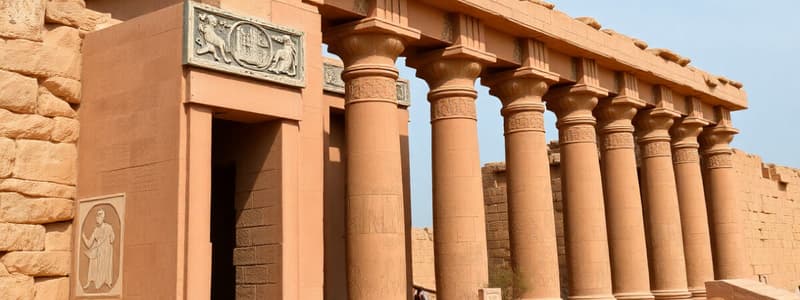Podcast
Questions and Answers
Which civilization is recognized for the development of cuneiform writing?
Which civilization is recognized for the development of cuneiform writing?
- Ancient Mesopotamia (correct)
- Yellow River Civilization
- Ancient Egypt
- Indus Valley Civilization
What significant achievement is uniquely associated with the civilization along the Nile River?
What significant achievement is uniquely associated with the civilization along the Nile River?
- Establishment of city-states
- Invention of the wheel
- Creation of a codified legal system
- Development of sophisticated irrigation systems (correct)
Which period is characterized by the emergence of feudalism in Europe?
Which period is characterized by the emergence of feudalism in Europe?
- The Middle Ages (correct)
- The Renaissance
- The Age of Exploration
- Classical Antiquity
Which ancient civilization is credited with significant contributions to mathematics and law codes?
Which ancient civilization is credited with significant contributions to mathematics and law codes?
What notable aspect of Greek civilization contributed to Western thought?
What notable aspect of Greek civilization contributed to Western thought?
Which of the following best describes a key feature of the Renaissance?
Which of the following best describes a key feature of the Renaissance?
What was a major outcome of the Age of Exploration beginning in the 15th century?
What was a major outcome of the Age of Exploration beginning in the 15th century?
What was a significant aspect of the social structure in early river valley civilizations?
What was a significant aspect of the social structure in early river valley civilizations?
Flashcards
Early Civilizations
Early Civilizations
Earliest known human societies that emerged in fertile river valleys, developing agriculture and complex structures.
Mesopotamia
Mesopotamia
Region between the Tigris and Euphrates rivers, known for early writing and law codes.
Ancient Egypt
Ancient Egypt
Civilization along the Nile River, noted for its theocratic government, irrigation, and pyramids.
Classical Antiquity
Classical Antiquity
Signup and view all the flashcards
Middle Ages
Middle Ages
Signup and view all the flashcards
Renaissance
Renaissance
Signup and view all the flashcards
Age of Exploration
Age of Exploration
Signup and view all the flashcards
Agricultural Surplus
Agricultural Surplus
Signup and view all the flashcards
Study Notes
Early Civilizations
- Human history spans millennia, marked by significant advancements and shifts.
- Early civilizations emerged in fertile river valleys, leveraging resources for agriculture.
- Examples include Mesopotamia, Egypt, Indus Valley, and Yellow River civilizations.
- These societies developed complex social structures, writing systems, and monumental architecture.
- Agricultural surplus led to specializations and societal stratification.
Ancient Mesopotamia
- Located between the Tigris and Euphrates rivers.
- Known for innovations in writing (cuneiform), mathematics, and law codes (Code of Hammurabi).
- Developed the earliest known city-states.
- Experienced periods of political unification and fragmentation.
- Mesopotamian culture significantly impacted later civilizations.
Ancient Egypt
- Developed along the Nile River, benefiting from predictable floods.
- Known for its sophisticated irrigation systems and agricultural practices.
- Characterized by a centralized, theocratic government headed by pharaohs.
- Developed hieroglyphic writing and advanced architectural achievements (pyramids).
- Emphasized elaborate burial rituals and the afterlife.
Classical Antiquity
- Involved civilizations like Greece and Rome that profoundly affected Western thought and culture.
- Greek city-states (poleis) fostered democracy and philosophy.
- Roman Republic and Empire expanded their power through conquest, creating a vast empire.
- Roman law, engineering, and political institutions laid groundwork for later societies.
- Greek and Roman ideas significantly influenced art, architecture, literature, and philosophy.
The Middle Ages
- A period spanning roughly from the 5th to the 15th century.
- Characterized by the fall of the Roman Empire and rise of feudalism in Europe.
- Emergence of the Catholic Church as a major institution.
- Development of universities and scholastic thought.
- Significant events such as the Crusades, the Black Death, and the rise of nation-states.
The Renaissance
- A period of renewed interest in classical learning and art.
- Emerged in Italy in the 14th century.
- Marked by a flourishing of artistic and intellectual creativity.
- Key figures such as Leonardo da Vinci, Michelangelo, and Raphael.
- Shift from medieval to modern ways of thinking and innovation.
The Age of Exploration
- Beginning roughly in the 15th century.
- Europeans embarked on voyages of discovery and expansion.
- Driven by the desire for trade routes to Asia.
- Colonization led to interaction between diverse cultures and societies.
- Reshaping of global trade dynamics and economic structures.
The Modern Era
- Characterized by industrialization, scientific advancements, and political revolutions.
- Increased globalization and interconnectedness.
- Shifting power dynamics and global conflicts.
- Emergence of modern nation-states and ideologies.
- Development of new technologies and innovations.
Studying That Suits You
Use AI to generate personalized quizzes and flashcards to suit your learning preferences.




